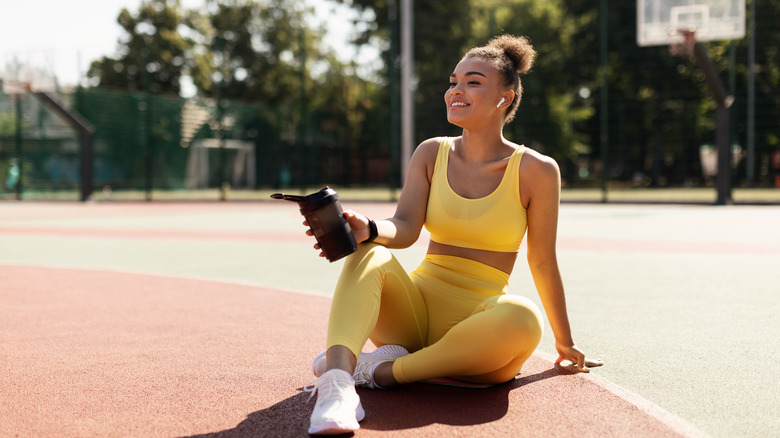Is It Bad To Drink An Energy Drink Before Working Out?
Energy drinks have become a popular way to get quick energy, as the name suggests. It's estimated that 5.5% of adults in the United States (aged 20 to 39) have energy drinks on any given day, according to Reuters. And using energy drinks before and during exercise is also becoming popular, although energy drinks might not be the best choice for staying active.
Energy drinks primarily consist of three ingredients: caffeine, sugar, and a blend of other stimulants, explains the American College of Sports Medicine (ACSM). While some research shows that low amounts of caffeine may provide benefits to athletic performance (per Healthline), energy drinks should not be used to replenish fluids or be the only beverage drunk during exercise.
Proper hydration is key to an effective exercise session, and energy drinks are unable to provide it. It's recommended to drink 5 to 6 milliliters of water per kilogram of body weight during the hours leading up to exercise, explains the ACSM.
The difference between sports drinks and energy drinks
It's important to understand the difference between sports drinks and energy drinks. Both are used in different situations and provide energy to the body in different ways.
A typical energy drink will use caffeine, ginseng, and other stimulants to energize the body. Caffeine increases the effects of neurotransmitters serotonin, dopamine, and acetylcholine. It raises the activity in your brain and nervous system, according to Tufts Journal.
However, while that energizing feeling may give you the motivation to work out, it's actually not the best choice. Energy drinks should not be used to replace fluids that are lost during a workout, especially carbonated drinks. They can cause nausea or bloating during a workout because of the gas blended into the water, explains Seattle Times.
Unlike energy drinks, sports drinks, such as Gatorade and Powerade, were designed to replenish athletes during a workout. They help replenish glucose, lost fluids, electrolytes, and some brands even include B vitamins, according to Harvard Health Publishing. All of this replaces nutrients that may be lost during exercise. But due to high levels of sugar, even sports drinks are only recommended in cases of vigorous exercise that lasts longer than an hour.
Energy drinks contain too much caffeine
Research shows that a small amount of caffeine can actually boost performance in endurance exercises and sports, like running. The International Society of Sports Nutrition even recommends consumption in low-to-moderate amounts of 3 mg/kg to 6 mg/kg of caffeine for optimal performance.
However, that doesn't mean you should start drinking energy drinks before every workout. Having more than 400 mg of caffeine in one day can lead to negative health effects, such as tremor and heart palpitations, according to a study from the Current Sports Medicine Reports.
For context, a 16-ounce Starbucks Grande coffee is 330 mg of caffeine, according to Consumer Reports. Combine that with an energy drink and you have already exceeded what is considered to be the safe amount of daily caffeine intake.
Overall, it's not advised to have energy drinks as a replacement for sports drinks or water before or during exercise. It's very easy to drink too much, which will put you at risk for serious health effects.



